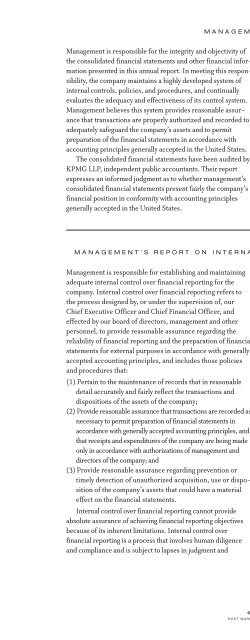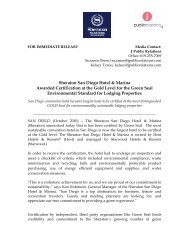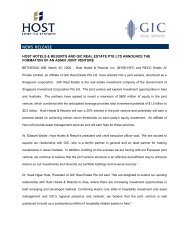Host Marriott 2004 Annual Report - Host Hotels & Resorts, Inc
Host Marriott 2004 Annual Report - Host Hotels & Resorts, Inc
Host Marriott 2004 Annual Report - Host Hotels & Resorts, Inc
You also want an ePaper? Increase the reach of your titles
YUMPU automatically turns print PDFs into web optimized ePapers that Google loves.
MANAGEMENT’S REPORT<br />
Management is responsible for the integrity and objectivity of<br />
the consolidated financial statements and other financial information<br />
presented in this annual report. In meeting this responsibility,<br />
the company maintains a highly developed system of<br />
internal controls, policies, and procedures, and continually<br />
evaluates the adequacy and effectiveness of its control system.<br />
Management believes this system provides reasonable assurance<br />
that transactions are properly authorized and recorded to<br />
adequately safeguard the company’s assets and to permit<br />
preparation of the financial statements in accordance with<br />
accounting principles generally accepted in the United States.<br />
The consolidated financial statements have been audited by<br />
KPMG LLP, independent public accountants. Their report<br />
expresses an informed judgment as to whether management’s<br />
consolidated financial statements present fairly the company’s<br />
financial position in conformity with accounting principles<br />
generally accepted in the United States.<br />
The Board of Directors pursues its responsibility for the<br />
financial statements through its Audit Committee, composed of<br />
three directors not otherwise employed by the company. The<br />
committee meets a minimum of four times during the year with<br />
the independent public accountants, representatives of management<br />
and the internal auditors to review the scope and<br />
results of the internal and external audits, the accounting principles<br />
applied in financial reporting, and financial and operational<br />
controls. The independent public accountants and<br />
internal auditors have unrestricted access to the Audit<br />
Committee with or without the presence of management.<br />
W. Edward Walter<br />
EXECUTIVE VICE PRESIDENT AND CHIEF FINANCIAL OFFICER<br />
MANAGEMENT’S REPORT ON INTERNAL CONTROL OVER FINANCIAL REPORTING<br />
Management is responsible for establishing and maintaining<br />
adequate internal control over financial reporting for the<br />
company. Internal control over financial reporting refers to<br />
the process designed by, or under the supervision of, our<br />
Chief Executive Officer and Chief Financial Officer, and<br />
effected by our board of directors, management and other<br />
personnel, to provide reasonable assurance regarding the<br />
reliability of financial reporting and the preparation of financial<br />
statements for external purposes in accordance with generally<br />
accepted accounting principles, and includes those policies<br />
and procedures that:<br />
(1) Pertain to the maintenance of records that in reasonable<br />
detail accurately and fairly reflect the transactions and<br />
dispositions of the assets of the company;<br />
(2) Provide reasonable assurance that transactions are recorded as<br />
necessary to permit preparation of financial statements in<br />
accordance with generally accepted accounting principles, and<br />
that receipts and expenditures of the company are being made<br />
only in accordance with authorizations of management and<br />
directors of the company; and<br />
(3) Provide reasonable assurance regarding prevention or<br />
timely detection of unauthorized acquisition, use or disposition<br />
of the company’s assets that could have a material<br />
effect on the financial statements.<br />
Internal control over financial reporting cannot provide<br />
absolute assurance of achieving financial reporting objectives<br />
because of its inherent limitations. Internal control over<br />
financial reporting is a process that involves human diligence<br />
and compliance and is subject to lapses in judgment and<br />
breakdowns resulting from human failures. Internal control over<br />
financial reporting also can be circumvented by collusion or<br />
improper management override. Because of such limitations,<br />
there is a risk that material misstatements may not be prevented<br />
or detected on a timely basis by internal control over financial<br />
reporting. However, these inherent limitations are known<br />
features of the financial reporting process. Therefore, it is<br />
possible to design into the process safeguards to reduce,<br />
though not eliminate, this risk.<br />
Management has used the framework set forth in the<br />
report entitled “Internal Control—Integrated Framework”<br />
published by the Committee of Sponsoring Organizations<br />
(“COSO”) of the Treadway Commission to evaluate the<br />
effectiveness of the company’s internal control over financial<br />
reporting. Management has concluded that the company’s<br />
internal control over financial reporting was effective as of<br />
the end of the most recent fiscal year. KPMG LLP has issued<br />
an attestation report on management’s assessment of the<br />
company’s internal control over financial reporting.<br />
Christopher J. Nassetta<br />
PRESIDENT AND CHIEF EXECUTIVE OFFICER<br />
W. Edward Walter<br />
EXECUTIVE VICE PRESIDENT AND CHIEF FINANCIAL OFFICER<br />
65<br />
HOST MARRIOTT <strong>2004</strong>








